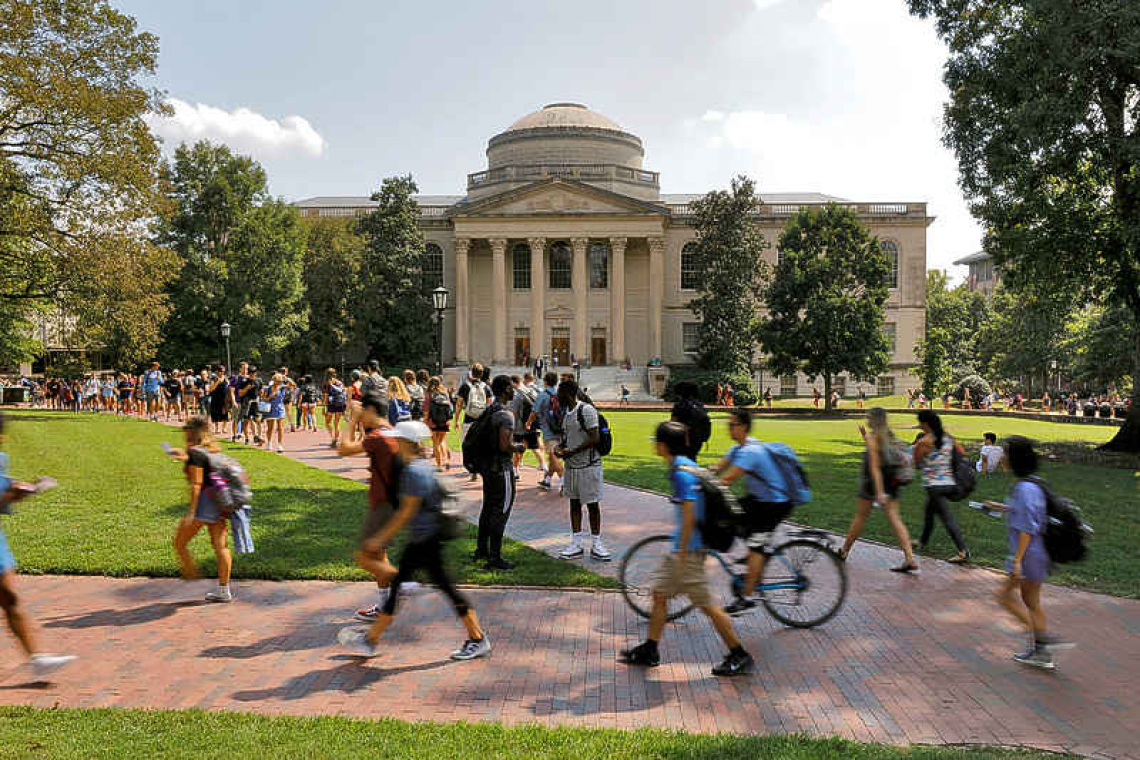Students walk past Wilson Library on the campus of the University of North Carolina at Chapel Hill, North Carolina, U.S., September 20, 2018.
WASHINGTON--Conservative U.S. Supreme Court justices signalled skepticism on Monday toward the legality of race-conscious admissions policies in cases involving Harvard University and the University of North Carolina that could imperil affirmative action programmes often used to boost enrollment of Black and Hispanic students.
The court, which has a 6-3 conservative majority, heard tense arguments lasting nearly five hours in appeals by a group founded by anti-affirmative action activist Edward Blum of lower court rulings upholding policies used by the two prestigious schools to foster student diversity.
The conservative justices voiced doubt about allowing race to be considered at all in admissions decisions by colleges and universities and emphasized that court precedents allowing such policies had cautioned that they should not exist forever. The liberal justices defended a limited consideration of race in admissions as one factor among many to give opportunities to deserving applicants. Rulings are due by the end of June.
"So what is your response to the simple argument that college admissions are a zero-sum game?" conservative Justice Samuel Alito asked a lawyer representing a group of students supporting UNC's policy. "And if you give a 'plus' to a person who falls within the category of under-represented minority, but not to somebody else, you're disadvantaging the latter student?"
Conservative Justice Clarence Thomas, one of the court's two Black justices, expressed misgivings about the principle of diversity and its educational benefits. "I've heard the word 'diversity' quite a few times and I don't have a clue what it means," Thomas said.
"I don't put much stock in that because I've heard similar arguments in favour of segregation, too," Thomas added.
Conservative Justice Brett Kavanaugh told the state lawyer defending UNC's policy that the court's precedents have held that "these racial classifications are potentially dangerous and must have a logical end point."
Students for Fair Admissions, Blum's group, said UNC discriminates against white and Asian American applicants and Harvard discriminates against Asian American applicants. The schools disagree.
Many schools place a premium on achieving a diverse student population not simply to remedy racial inequity and exclusion in American life but to bring a range of perspectives onto campuses. Harvard and UNC have said they use race as only one factor in a host of individualized evaluations for admission without quotas - permissible under Supreme Court precedents - and that curbing its consideration would cause a significant drop in enrollment of students from under-represented groups.
The cases give the court an opportunity to overturn its prior rulings - including one as recent as 2016 - allowing race-conscious admissions policies. They also give it a chance to embrace an interpretation favored by conservatives of the U.S. Constitution's 14th Amendment promise of equal protection under the law that would bar governments and other institutions from using race-conscious policies - even those crafted to benefit people who have endured discrimination.
The court is confronting this divisive issue four months after its conservative majority drove major rulings curtailing abortion rights and widening gun rights.







